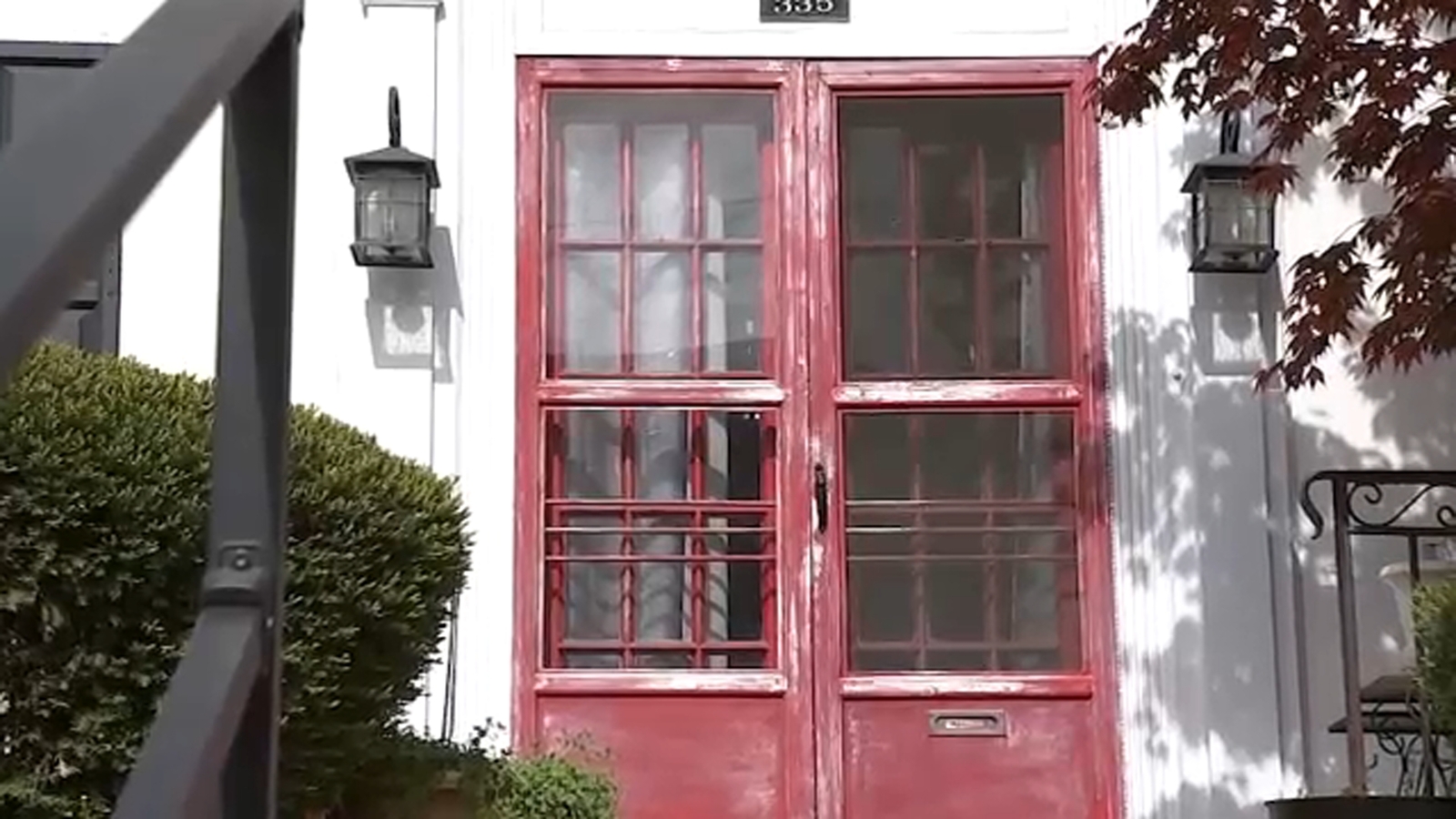UPPER DARBY, Pa. (WPVI) — Gloria Gaynor, 91, has spent her life building the American Dream. Now, because of just $3,500 in overdue taxes, she is losing it all.
Gaynor, who has dementia, is confined to a hospital bed in the living room of the Upper Darby home she owned for nearly 25 years. The house is filled with knick-knacks, china cabinets and photos of her children and grandchildren. A sign hanging in the entryway reads: “May Blessings From Above Fall Upon This Home.”
But Gaynor and her home are still waiting for a much-needed blessing. Three years ago, Gaynor learned that Delaware County auctioned off her property at an upset sale, a method many local governments use to recover delinquent taxes. She is now being pushed out of the house she worked for decades to afford.
“We are up the creek with nowhere to go and no help, nothing,” said her daughter, Jackie Davis, who now lives in Florida. The new owners of Gaynor’s home want her out by the end of July, Davis added.
County records show a Lancaster-based real estate firm bought Gaynor’s home from the Tax Claim Bureau in September 2022 for just $14,419 — the price of her unpaid taxes plus fees and penalties. After several failed attempts by Gaynor and her family to appeal the sale and redeem her property, the company acquired the deed to the home, now valued at $247,000, this spring.
“An investor who does this is likely to make a good profit no matter what happens,” said John Rao, a senior attorney with the National Consumer Law Center. “Even if the homeowner does redeem and pays everything that’s owed, they get a great return on investment because in most states, the taxes incur interest and the interest is set higher after it goes to foreclosure.”
Earlier this year, Davis flew to Pennsylvania to care for her mother as she recovered from a hospital stay. Now, she must return to pack up Gaynor’s belongings and find her a new place to live.
“Hang in there, Ma,” Davis said as she tucked a blanket around Gaynor and gently wiped her mother’s eyes with a washcloth.
Losing the house has taken a heavy toll on her mother, Davis said: “She cries about it every day, she prays about it every day.”
Chasing the American Dream
Originally from Jamaica, Gaynor came to the United States with her two young children in the late 1960s, settling in the Philadelphia area. She supported her family as a house cleaner and caregiver at a local nursing home.
“She worked very, very hard all her years,” Davis said of her mother.
Gaynor’s father used to say, “You must always have a roof over your head, eat good food and wear good clothes,” Davis recalled, adding, “And trust me, she did all that.”
After decades of renting in the area, Gaynor purchased her home on Wayne Avenue in Upper Darby for $123,000 in 2000. She has since paid off nearly all of her mortgage.
“She bought this house to die in,” Davis said.
Gaynor was planning to leave the home to her grandson, providing a foundation for him to build on her successes.
Davis believed her mother was able to afford the taxes on the house, she said, adding that she’d paid off her mother’s car to “alleviate some of the stress.”
But Gaynor’s staunch independence made it difficult for her children to be involved in her affairs.
“She’s a strong-headed woman, and she felt as though she can manage,” Davis explained. “So she wouldn’t let us in.”
Gaynor could manage on her own until COVID hit, her daughter noted. During the isolation of the pandemic, her cognitive abilities declined.
“She didn’t take any vaccine, she said she wasn’t going out, she has a lot of underlying issues,” Davis said.
In 2020, Gaynor skipped her annual trip to the tax office. She’d heard tax collectors were pausing enforcement and decided she would pay what she owed when she could go down to the office in person again, Davis said.
When the government restarted collection efforts, Gaynor went to the county tax office and made a payment, intending to cover her previous year’s taxes, according to her attorney, Alexander Barth.
Instead, the money was applied to Gaynor’s 2021 taxes and not her outstanding balance from 2020, “leaving what is essentially a donut in her tax payment history,” Barth explained.
“Unfair,” but not illegal
By 2022, Gaynor had unwittingly accumulated tax debt that was two years overdue, making her property eligible for tax sale under Pennsylvania law.
Delaware County sold the claim to her property for just five percent of the home’s appraised value, with local real estate developer CJD Group placing the sole bid.
Instead of Gaynor’s family inheriting the equity she’d built in her home, the private firm got a great deal on an investment.
“This is stripping generational wealth from the have-nots and allowing the haves to have it,” Barth said, though he stressed that the company did nothing illegal.
Through its attorney, CJD Group declined multiple requests for comment.
Gaynor’s house isn’t the only property CJD Group has purchased for a fraction of its estimated value, public records show. Since 2011, the company has acquired 62 deeds from Delaware County tax sales, making it the second-most frequent purchaser of tax-defaulted properties countywide.
It’s difficult to determine exactly how much these properties were worth when CJD Group bought them, because potential buyers cannot inspect properties up for tax sale. Often, these buildings have substantial damage or hazards that need to be mitigated.
But even before fixing up and flipping the houses, the real estate firm got a windfall by extracting the properties’ excess equity at tax sales. In total, CJD Group spent just over $5 million on these homes, but tax assessments and previous sale prices suggest their actual combined value was at least twice that amount.
The investors essentially got a discount of millions of dollars on these purchases — at the expense of homeowners who fell behind on their taxes.
Rao described this process as “unfair,” but he agreed with Barth that CJD Group had acted within the law in purchasing and foreclosing on Gaynor’s home.
“Unfairness doesn’t always mean that it’s illegal,” Rao noted.
A Delaware County spokesperson declined an interview request. In a statement, the spokesperson wrote that while the County sympathizes with the emotional toll on Gaynor, the Tax Claim Bureau followed state law, issuing multiple notifications before selling the property.
“These notices were sent and posted over the course of several months, including directly to the property owner in July 2022,” the statement read.
But mailed notifications aren’t always effective for homeowners like Gaynor, Barth said.
“A 91-year-old is looking at a notice saying, ‘This scares me, but I don’t know — When is this going to happen?'” he added. “‘Is this real? Is this a fraud? Is this a scam?'”
Barth, Rao and other tax sale experts argued that safeguards need to be put in place to prevent the elderly and other vulnerable homeowners from losing their assets.
“I agree if you don’t pay your taxes, there has to be some consequences to that,” Rao commented. “But the question is just how much do you have as a penalty?”
As the cost of homeownership rises, he added, more and more Americans will be forced to pay this penalty.
“Particularly in communities where property values are increasing substantially, this is a problem,” Rao said. “There’s a lot of interest in trying to buy those properties by tax purchasers because they know they can flip them very quickly and make a real substantial profit.”
The appeal of gentrifying neighborhoods means tax sales disproportionately affect low-income communities of color.
An ABC analysis of Philadelphia tax sale data found that 93% of the 853 properties up for sale in this year’s tax foreclosure auctions are in majority non-white neighborhoods.
“A turning point”
In 2023, the U.S. Supreme Court declared it unconstitutional for local governments to keep surplus money generated from tax lien foreclosures. In a unanimous opinion, the Court ruled that retaining payments above and beyond the taxes owed amounted to unlawful taking without the “just compensation” required by the Constitution.
“The Supreme Court decision has really made policymakers sort of think about this issue more than they ever have,” Rao said, characterizing the current moment as “a turning point” in tax sale law.
While local taxing authorities handle these sales differently, many states have recently changed their policies to comply with the federal ruling.
In New Jersey, where Barth also practices, only the debt on property taxes is automatically sold at auction, and investors bid down the interest rate they’ll receive on the purchased lien. Homeowners then have two years to pay off their taxes, fees and interest tacked on by the investor before facing foreclosure.
“It gives breathing room to the property owner, it gives an opportunity for businesses,” Barth said.
Last year, New Jersey legislators changed the law to allow homeowners to request a sale of their actual property, rather than just their debt. Any excess proceeds from such a sale would then go to the homeowner.
However, Rao noted, New Jersey homeowners have to file a formal motion to request a sale of their property, and doing so often requires hiring an attorney.
“If they could do all that, then they probably would have paid their taxes or redeemed,” Rao argued. “Maybe they’re just not going to be able to keep their property and that’s why they’re in that situation, but they still should be able to get their equity if there is equity.”
In Pennsylvania, where counties auction off tax-defaulted properties, rather than liens, homeowners can claim any surplus proceeds from the sale. But when only one bidder makes an offer on a house, there often aren’t proceeds above the taxes and fees owed.
To Rao, this type of nominal right to a surplus may not actually meet the newly held constitutional requirement. The legality of such practices will be determined in courtrooms across the country, he said, but in the meantime, governments should be focusing more on preventing tax-defaulted homes from going up for sale in the first place.
Pennsylvania state lawmakers are now considering a bill that could do just that. House Bill 96, which passed the Pennsylvania House of Representatives with strong bipartisan support, would allow homeowners to designate a third party to receive copies of any delinquent tax notices.
“If your house does start to go through the tax sales process, those people would be notified in addition to the owner,” said Representative Chris Pielli, the bill’s prime sponsor. “They could intervene and check up and see how they could help to stop some of these bad outcomes we’ve seen in the past.”
As an attorney conducting guardianship proceedings, Pielli saw many Pennsylvanians like Gaynor lose their homes at tax sales, he said. Often, he noted, they were “folks who are suffering from cognitive impairment, and who need a little extra help, and unfortunately lose the homes that they worked so hard for all their lives.”
Pielli introduced HB 96 as a guardrail against the exploitation of these vulnerable homeowners. While he acknowledged that optional third-party notification is just the first step, he said he believes such policies might have prevented situations like Gaynor’s.
“If this becomes law,” Pielli said of the bill, which is now being considered by the state Senate, “it will save a lot of heartache for homeowners and their relations going forward.”
Under current Pennsylvania law, Gaynor has run out of options. Two courts upheld the sale of her home, and the door is closing on her time on Wayne Avenue in Upper Darby.
“This is our legacy,” said Davis, “and here it is, it’s gone.”
Copyright © 2025 WPVI-TV. All Rights Reserved.







